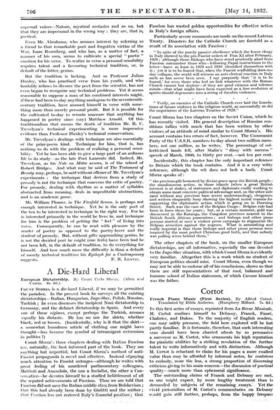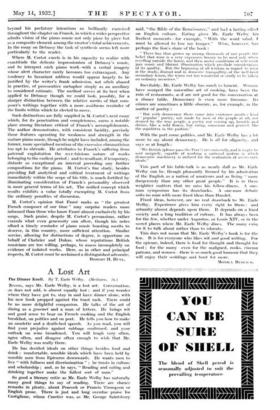Cortot
French Piano Music (First Series). By Allied Cortot. Translated by Hilda Andrews. (Humphrey Milford. 7s. ed.)
Ix this first series of essays, reprinted from La Revue Musicale, M. Cortot confines himself to Debussy, Franck, Faure, Chabrier, and Dukas. To the majority of English readers, one may safely presume, the field here explored will be but partly familiar. It is fortunate, therefore, that such interesting seas should have been charted afresh by so persuasive a surveyor as M. Cortot, who ornaments his high reputation for pianistic abilities by a striking revelation of the further talent to write informatively and with distinction. Although M. Cortot is reluctant to claim for his pages a more exalted value than -may be afforded by informal notes, he contrives to embody, none the less, a strong 'proportion of discerning criticism giving to his main concern—the discussion of poetical quality--much more than ephemeral significance. .
The outstanding claims of Franck and Debussy arc met, RS one might expect, by more lengthy treatment than is demanded by subjects of the remaining essay9. Yet the vivid pictorialism of M. Cortot's commentaries on Debussy wauld gaiu still further, perhaps, from the happy trespass
beyond his prefatory intentions so brilliantly exercised throughout the chapter on Franck, in which a wider perspective admits vision of the piano music not only piece by piece but as a composite element among the creator's total achievements. In the essay on Debussy the task of synthesis seems left more particularly to the reader.
Where M. Cortot excels is in his capacity to realize with exactitude the delicate impressionism of Debussy's music, and to interpret each piano work -with a verbal imagery whose alert character rarely becomes too extravagant. Any tendency to luxuriant address would appear largely to be justified by the writer's frank admission, not ofteh abused in practice, of provocative metaphor simply as an auxiliary to considered estimate. The method serves at its best when applied to Debussy though we could look, possibly, for a sharper distinction between the relative merits of that com- poser's Writings together with a more assiduous reminder of the limits within whirl, he elected to move.
Such distinctions are fully supplied in M. Cortot's next essay which, for its penetration and completeness, earns a notable place among literature critical of Franck's accomplishments. The author demonstrates, with consistent lucidity, precisely those features operating for weakness and strength in the mature piano music, though lie might have included, among the former, snore specialised mention of the excessive chromaticism too apt to obtrude. He attributes to Franek's suffering front paternal exploitation the mwtricious nature of works belonging to the earliest period ; and to resultant, if temporary, distaste so exceptional an interval preceding any further compositions for the piano. M. Cortot's fine study, besides providing full analytical and critical treatntent of writings immediately within the scope of his title, is much fortified by illuminating consideration of Franck's personality observed in more general terms of his art. The unified concept which results exhibits a value totally exempting M. Cortot from the ordinary penalties of discursion.
M. Cortot's opinion that Faure ranks as '' the greatest French composer of our time" may surprise readers more informed than those who know Faure almost exclusively by his songs. Such praise, despite M. Cortot's persuasions, rather exceeds what even generosity ran allow, though his notes afford a timely reminder of piano music boasting merits to deserve, in this country, more sufficient attention. Similar service, allowing for distinctions of degree, is opportune on behalf of Chabrier and Dukas, whose reputations British musicians are too willing, perhaps, to assess incompletely on evidence of isolated works. Here, as in other and principal respects, M. Cortot must be acclaimed a distinguished advocate: ROBERT H. Hum..





































 Previous page
Previous page